Key Concepts in Cosmology
- Big Bang Theory: Explore the evidence supporting the Big Bang as the origin of the universe.
- Galaxies: Learn about the formation, classification, and distribution of galaxies in the universe.
- Dark Matter: Understand the concept of dark matter and its role in the structure of the universe.
- Dark Energy: Investigate the mysterious force known as dark energy and its influence on the expansion of the universe.
- Cosmic Microwave Background Radiation: Examine the significance of CMB radiation as a remnant of the early universe.
- Ultimate Fate of the Universe: Consider the various possible scenarios for the future of the universe, such as the Big Freeze, Big Crunch, or Big Rip.
Methods of Cosmological Study
- Observational Cosmology: Explore the use of telescopes, space probes, and other observational tools to study the universe.
- Computational Cosmology: Understand the use of computer simulations and modeling to test cosmological theories and hypotheses.
- Theoretical Cosmology: Learn about the development of mathematical models and theoretical frameworks to explain the behavior of the universe.
- Interdisciplinary Approaches: Consider how cosmology draws on principles from physics, astronomy, and other scientific disciplines.
Impact and Relevance of Cosmology
- Technological Innovations: Explore how advances in cosmological research have led to the development of new technologies and instruments with practical applications.
- Philosophical and Ethical Implications: Consider the broader implications of cosmological discoveries for our understanding of humanity's place in the universe.
- Public Engagement: Investigate how cosmological research is communicated to the public and its role in inspiring curiosity and scientific literacy.
◂Science Worksheets and Study Guides Sixth Grade. Magnetism
Study Guide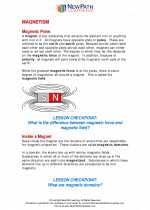 Magnetism
Magnetism  Activity Lesson
Activity Lesson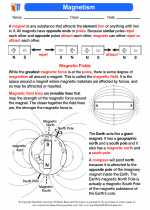 Magnetism
Magnetism  Worksheet/Answer key
Worksheet/Answer key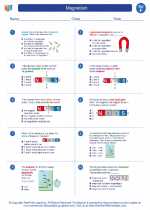 Magnetism
Magnetism  Worksheet/Answer key
Worksheet/Answer key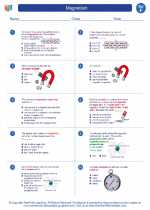 Magnetism
Magnetism  Worksheet/Answer key
Worksheet/Answer key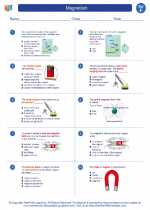 Magnetism
Magnetism  Worksheet/Answer key
Worksheet/Answer key Magnetism
Magnetism  Vocabulary/Answer key
Vocabulary/Answer key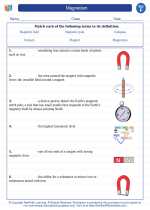 Magnetism
Magnetism 

 Activity Lesson
Activity Lesson
 Worksheet/Answer key
Worksheet/Answer key
 Worksheet/Answer key
Worksheet/Answer key
 Worksheet/Answer key
Worksheet/Answer key
 Worksheet/Answer key
Worksheet/Answer key
 Vocabulary/Answer key
Vocabulary/Answer key

The resources above cover the following skills:
EARTH AND SPACE SCIENCE
Earth’s Systems
Develop and use models of Earth’s interior composition to illustrate the resulting magnetic field (e.g., magnetic poles) and to explain its measureable effects (e.g., protection from cosmic radiation).